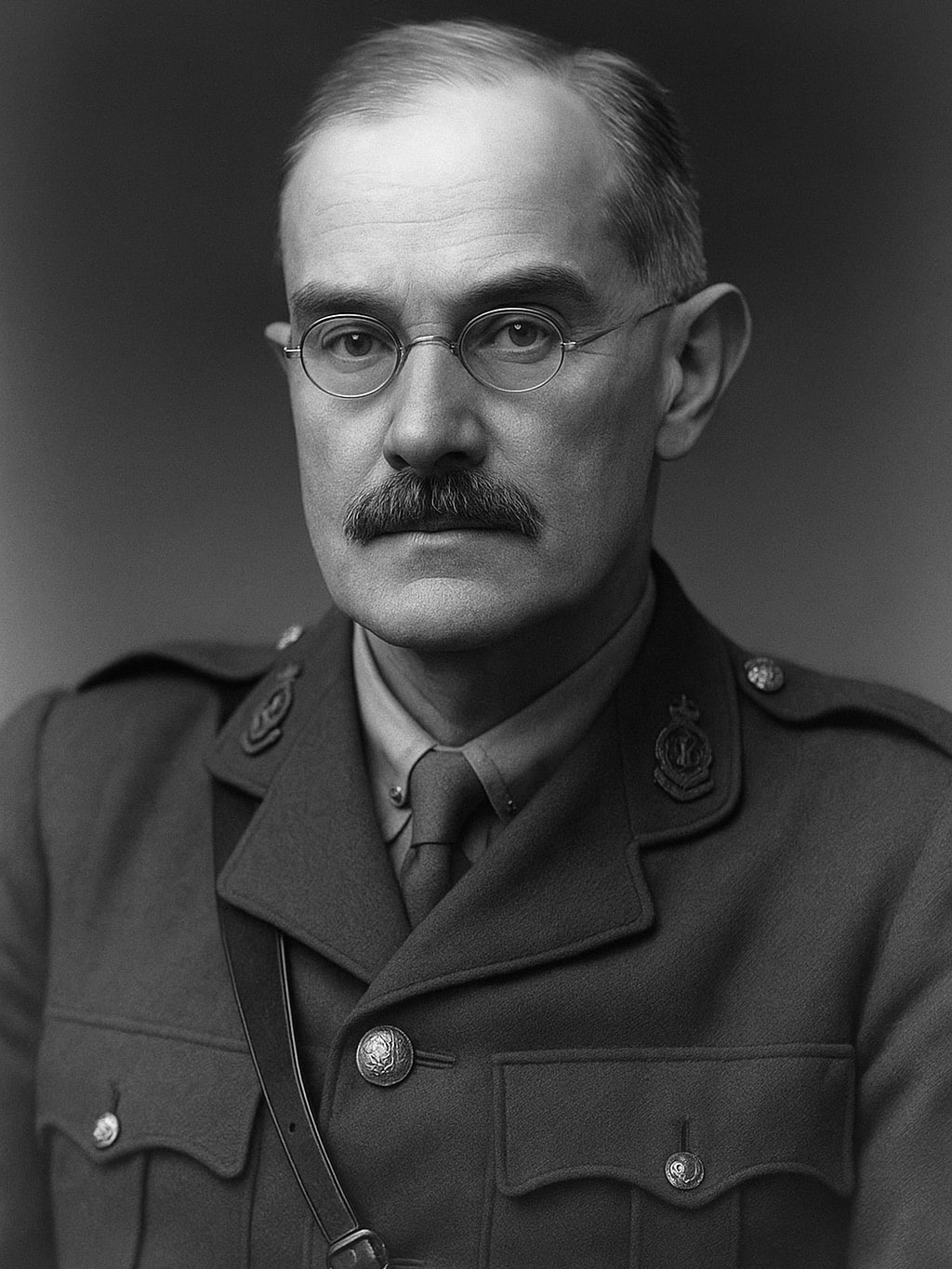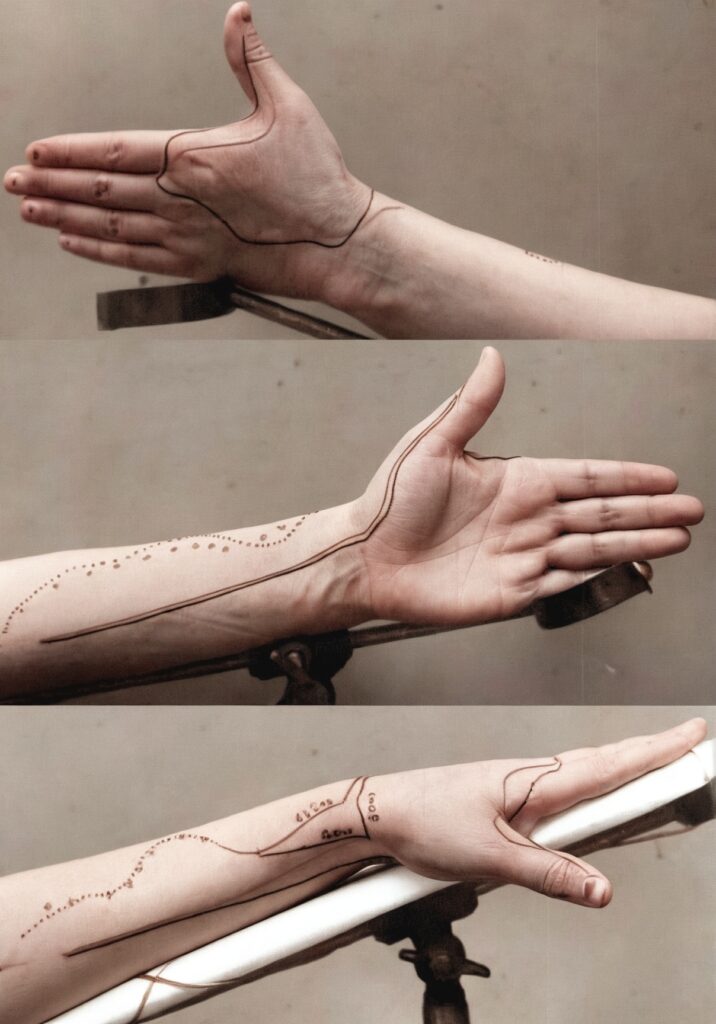William Rivers

William Halse Rivers Rivers (1864-1922) was an English psychiatrist, neurologist, anthropologist and polymath.
Rivers is especially remembered for his groundbreaking work in experimental neurology with Sir Henry Head (1861–1940), his compassionate psychiatric care of shell-shocked soldiers during World War I, and his pioneering contributions to anthropology and cross-cultural psychology. Rivers’ extensive interdisciplinary influence spanned the mapping of sensory systems, the development of abreaction therapy for war trauma, and genealogical methods in ethnology.
Rivers was born on March 12, 1864, in Luton, Kent, and educated at Tonbridge School and St. Bartholomew’s Hospital, London. He qualified in medicine in 1886, became MD London, and earned FRCP. He began his clinical career at the National Hospital, Queen Square, where he met Hughlings Jackson (1835–1911), Michael Foster (1836–1907), Henry Head, and Charles Sherrington (1857–1952). In 1892 he studied under Ewald Hering (1834–1918) in Jena, and later with Emil Kraepelin (1856–1926) in Heidelberg.
His pivotal collaboration with Head (1903–1908) involved the surgical section and mapped recovery of Head’s own radial nerve, revealing distinct sensory modalities: deep, protopathic, and epicritic. This experiment, published in Brain in 1908, marked a cornerstone in somatosensory neuroscience. Rivers also co-founded the British Journal of Psychology in 1904 and led the Cambridge psychology laboratory.
Rivers conducted fieldwork with the Torres Strait Expedition (1898) and among the Todas in southern India, introducing genealogical methods to anthropology. His The History of Melanesian Society (1914) challenged racial and evolutionary theories with culturally contextual approaches. During World War I, as a Captain in the Royal Army Medical Corps, he treated war neurosis at Craiglockhart War Hospital. His psychotherapeutic methods influenced Siegfried Sassoon (1886–1967), Wilfred Owen (1893–1918), and Robert Graves (1895–1985). His 1917 lecture “The Repression of War Experience” became a landmark in trauma psychology.
After the war, Rivers became politically engaged, joining the Labour Party and advocating for workers’ education and decolonial policies. He died of a strangulated hernia on June 4, 1922, shortly before a planned research tour of India and Scandinavia. Rivers’ legacy spans PTSD research, somatosensory physiology, comparative anthropology, and humane psychiatric care.
Biography
- 1864 – Born March 12 in Luton, Kent
- 1886 – Qualified in medicine from St. Bartholomew’s Hospital, London
- 1887–1890 – Junior posts at Chichester Infirmary and St. Bartholomew’s Hospital
- 1890 – Joined National Hospital, Queen Square; met Henry Head and Charles Sherrington
- 1892 – Studied physiology under Ewald Hering in Jena
- 1893 – Worked with Emil Kraepelin in Heidelberg
- 1897 – Appointed Lecturer in Physiological and Experimental Psychology, Cambridge
- 1898 – Anthropological fieldwork with Torres Strait Expedition
- 1900 – Co-authored dermatome mapping with Head and Campbell
- 1903 – Began sensory nerve regeneration studies with Henry Head
- 1904 – Co-founded the British Journal of Psychology
- 1907 – Appointed Director of the Cambridge Psychology Laboratory
- 1908 – Published sensory nerve regeneration findings in Brain; elected FRS
- 1914 – Published The History of Melanesian Society
- 1915–1918 – Treated war neurosis at Craiglockhart War Hospital during WWI
- 1917 – Delivered “The Repression of War Experience” to the Royal Society of Medicine
- 1922 – Died June 4 from a strangulated hernia in Cambridge
Key Medical Attributions
Sir Henry Head (1861-1940) and James Sherren (1872-1945) had tried to determine the sensibility remaining after complete division of all cutaneous nerves without injury to the muscular branches. However accidents of this nature were exceedingly rare, and although ‘real patients’ were helpful it was deemed that “Introspection could be made fruitful by the personal experiences of a trained observer only“. The decision was therefore made to perform surgical transection on the left hand radial nerve of Head, with evaluation of results by Rivers…
At the time of the experiment, H. was nearly 42 years of age and in perfect health. Since boyhood he had suffered from no illnesses, excepting as the consequence of wounds in the post-mortem room….For two years before these experiments began he had given up smoking entirely. No alcohol was ever taken on the days during which he was under examination.
On April 25, 1903…an incision 6.5 in. (16.5 cm.) long was made in the outer bicipital fossa extending along the axial line of the left upper extremity…the radial nerve was divided at the point where it arises from the musculospiral (N. radialis). A small portion was excised, and the ends united with two fine silk sutures. The external cutaneous nerve (N. cutaneus antibrachii lateralis) was also divided…and sutured with fine silk
Rivers 1908
Following the surgical section and repair of Head’s superficial radial nerve, Sherren and Rivers commenced rigorous and meticulous observation through sensory testing and evaluating psycho-social responses during the period of recovery and for the following 5 years. This contributed greatly to the understanding of the sensory examination following nerve injury

Further Medical Contributions
Protopathic and Epicritic Sensation
Rivers and Head distinguished two cutaneous sensory systems during recovery from radial nerve injury.
- Protopathic sensation detects crude, poorly localized pain and temperature, especially extremes; it has strong emotional (usually aversive) tone.
- Epicritic sensation provides fine touch, temperature discrimination, and accurate localization; it allows object recognition through tactile input.
This typology prefigured modern classification of nerve fibres (A and C fibres).
Mapping of Dermatomes
With A.W. Campbell, Rivers and Head examined patients with shingles to map cutaneous innervation patterns. Their work established the first accurate and clinically used dermatome maps, still foundational in neurology.
Shell Shock and Abreaction Therapy
At Craiglockhart, Rivers rejected the idea of hysteria or malingering in shell-shocked soldiers. He encouraged patients to process and verbalize traumatic memories, anticipating psychodynamic “abreaction.” His landmark paper “The Repression of War Experience” (1917) remains a classic in trauma literature.
Experimental Psychology and Drug Studies
Conducted pioneering double-blind studies on the effects of caffeine, alcohol, and fatigue. Advocated for rigorous controls and indistinguishable placebo use—precursors to modern clinical trial design.
Genealogical Anthropology
Developed genealogical method for documenting kinship and descent in fieldwork. Applied this in his studies among the Todas (India) and Melanesians, influencing 20th-century ethnography.
Major Publications
- Reports of the Cambridge Anthropological Expedition to Torres Straits 1901
- Head H, Rivers WHR, Sherren J. The afferent nervous system from a new aspect, 1905
- Rivers WHR. The Todas. 1906
- Rivers WHR. The influence of alcohol and other drugs on fatigue. The Croonian lectures delivered at the Royal college of physicians in 1906
- Rivers WH, Head H. A human experiment in nerve division. Brain 1908; 31(3): 323–450 [Radial nerve dissection]
- Rivers WHR. The disappearance of useful arts. 1912
- Rivers WHR. Kinship and social organisation. 1914
- Rivers WHR. The history of Melanesian society. 1914
- Rivers WH. The Repression of War Experience. Proc R Soc Med. 1918;11(Sect Psych):1-20.
- Rivers WH. Instinct and the unconscious. 1920
- Rivers WHR. Psychology and politics : and other essays. 1923
References
Biography
- Pearce JM. William Halse Rivers Rivers (1864-1922) and the sensory nervous system. Eur Neurol. 2008;60(4):208-11.
- Pearce JM. William Halse Rivers Rivers. Hektoen International 2021
Eponym
the person behind the name
